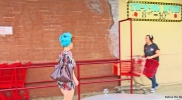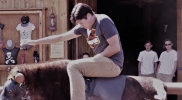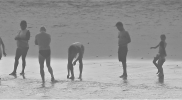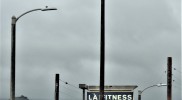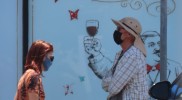|
|
Best Trivia - Anecdotes
|
Favorite Trivia – ANECDOTES |
|
The parents of the bride presented the minister who performed the ceremony with a pair of lather gloves. The minister said, ‘Thank you.’ His wife said, ‘Leather gloves? That’s a strange gift to give in June—but by October they will come in handy.’ In October, when the minister was putting on the gloves for the first time, he found each ‘finger’ of the glove stuffed with a $10 bill, wrapped in tissue paper! In 1934, $100 was a small fortune. The minister retells the story often, adding ‘That’s when I learned never to judge a book by its cover.'”
Dear Abby – Edythe Butcher, St. Petersburg, FL
|
|
“As [Steve] Martin’s star rose, his mother enjoyed his success: He writes about the time they were driving through Beverly Hills and she said, ‘Get out and walk down the street so I can watch people look at you.'”
The Three Stages of Steve Martin’s Journey to Happiness, by Judith Newman – AARP, June/July 2017
|
|
“The Me-llionaire: Like the mythological Narcissus, Donald Trump seemed simply besotted, preening in front of a floor-to-ceiling mirror. Trump palpably yearned for attention, plastering his name on gilded towers, casinos, an airline (that failed) and four vanity tomes. Even his ugly divorce from Ivana—’Don’t get mad, get everything’ was her famous war cry— proved an opportunity to elevate his skyscraper ego; he was reportedly gleeful as the sordid details of his affair with model Marla Maples (whom he later wed and dumped) played out for months in New York City’s tabloids. As a topper in 2000, Trump publicly flirted with running for President, no doubt blinded by visions of global summits and blaring fanfares of Hail to the Donald.”
Caption under photo of Donald Trump by Harry Benson (1990) – People Weekly Favorite Pictures, 2000
|
|
“Sat next to British Airways boss Rod Eddington at the monthly lunch today, and he revealed some of the hidden reasons Concorde has to be axed.
“‘Look, we lost about forty of our most regular Concorde fliers in the World Trade Center disaster. And after that our top dozen or so corporate clients decided it was too big a security risk and switched from Concorde accounts to normal first-class Jumbos and stuff.
“‘I’m talking about clients spending millions a year. Add the fact that a lot of other people stopped flying altogether, and you can see that it became very quickly a financial disaster to run.’
“I asked him if money was the only factor in his decision. ‘No, no, it was getting old anyway, and the parts were costing a fortune because nobody makes them any more. It would have stopped soon, regardless of 9/11.'”
Piers Morgan – The Insider
|
|
“Yesterday Amy took a cab home from her improv class. She sat in the back wearing sunglasses, and the driver tried to flirt with her, saying, ‘You’ve got beautiful eyes.’ Later she went to the Laundromat, where she saw a man carefully folding his wet clothes and putting them in the dryer.” [September 25, 1986]
David Sedaris – Theft by Finding: Diaries (1977-2002)
|
|
“Farrah [Fawcett] has never been one to back down from a confrontation. I remember one time when she was performing in Extremities on Broadway, and she and her assistant hopped into one of those New York City gypsy cabs. They weren’t going far, just from the hotel to the theater, and when she got there the cab driver pulled over to the curb.
“‘Gimme fifty bucks,’ he demanded.
“Farrah looked him straight in the eye and said, ‘Absolutely not.’ The driver, who didn’t really care for her answer, pulled a knife on her. Her assistant begged her to hand over the money.
“Never one to sit idly by and play the victim, Farrah responded in kind. Without hesitation, she took off her high-heeled shoe and threatened him right back with it. Then she grabbed twenty dollars out of her purse, threw it at him, and jumped out the door. Typical Farrah.” [June 1, 2008]
Alana Stewart – My Journey with Farrah
|
|
“Johnny Depp and Winona Ryder met in 1989. The Edward Scissorhands (1990) co-stars dated for nearly four years and were engaged for three (1990-1993) before calling if off—causing Depp to alter the ‘Winona Forever’ tattoo he had on his arm to read ‘Wino Forever’ instead.”
Parade, Jun 30, 2019
|
|
“[Robert] Lowell, born to one of Boston’s most illustrious families, was initially supportive of the war, but, became disillusioned; when his induction notice arrived in 1943, he refused to go. In a letter to President Roosevelt, Lowell argued that a war against civilians and geared toward unconditional surrender was an atrocity, and that it was incumbent upon free citizens of a democratic nation to take moral stands against injustice. He was sentenced to a year and a day in prison. At West Street Jail in New York City, his cell adjoined that of the condemned ganster Meyer Lepke, who said to Lowell, ‘I’m in for killing. What are you in for?’ Lowell’s reply: ‘I’m in for refusing to kill.’
“Lowell was released in 1944, and went on to become the preeminent poet of his generation.”
Against Forgetting: Twentieth Century Poetry of Witness – ed. by Carolyn Forché
|
|
“On the morning of September 11, Michael Lomonaco, the chef of Windows on the World, broke his glasses during breakfast service. He took the long ride down from the 107th floor to have them repaired, stepping out of the elevator just as the first plane hit. He stood on the ground as the building crumbled and the seventy-nine cooks, waiters, and dishwashers he had just left vanished. As he painfully made his way uptown, he couldn’t stop thinking about the families his colleagues had left behind, and he determined to do something to help them. The whole food world pitched in, and within a month they’d raised twenty-three million dollars.”
Ruth Reichl – Save Me The Plums
|
|
“Rachmaninoff, the pianist, having obliged me with his signature, owing to my sheer persistence, revealed to me today his reason for his extreme reluctance to give autographs. He said that a woman in Chicago got him to sign his name on a sheet of paper at a concert, and later, above the signature, she had typed a testimonial for her musical knowledge and landed herself a good job in the library of some film company—and kept it for several years, until he found out by the sheer coincidence of an executive saying that the woman he’d recommended was not so hot! Now at last I know the reason for his dead-pan expression to polite requests.”
Fred Bason’s Diary
|
|

LA Times, Sunday, December 5, 2021
|
|
“When I was 11 the whole world which was always closed to me suddenly opened up. Even the girls paid a little attention to me just because they thought, ‘Hmmm, she’s to be dealt with!’ And I had this long walk to school—2 1/2 miles to school, 2 1/2 miles back—it was just sheer pleasure. Every fellow honked his horn—you know, workers driving to work, waving, you know, and I’d wave back. The world became friendly.
“All the newspaper boys when they delivered the paper would come around to where I lived, and I used to hang from a limb of a tree, and I had sort of a sweatshirt on—I didn’t realize the value of a sweatshirt in those days. . . But here they’d come with their bicycles, you know, and I’d get these free papers and the family liked that, and they’d all pull their bicycles up around the tree and then I’d be hanging, looking kind of like a monkey, I guess. I was a little shy to come down. I did get down to the curb, kinda kicking the curb and kicking the leaves and talking, but mostly listening. . . It was just this sudden freedom, because I would ask the boys, ‘Can I ride your bike now?’ And they’d say, ‘Sure.’ Then I’d go zooming, laughing in the wind, riding down the block, laughing, and they’d all stand around and wait till I came back, but I loved the wind. It caressed me.”
Marilyn Monroe speaking with Richard Meryman, Life Magazine, August 3, 1962
|
|
“Aimée McPherson: the greatest showman missionary of modern times who did a great deal more good than harm. But oh, how she did love the limelight—more than any other film star. She came to Walworth—and with an open mind and a large autograph album I went to one of her Four Square Gospel meetings. . . And the crowd that attended—more people flocked to her revivals in one night than attended any other church or chapel in a month anywhere else in the borough. It was lots better than the cinema! I had a spiffing time watching people get ‘saved.’
“When the show was over I stood around waiting for Aimée to come along past me so that I could get her autograph. When she was at my side I said that her sermon had been a revelation to me—and begged for the kindness of her autograph. She looked round. There were many people close by, some wishing to be blessed and others cured of illness; others just to shake her hand. She said, ‘No, I will not sign your book.’ I asked why not—’it’s only as a souvenir.’ Her answer amazed me. ‘There are no press photographers around, sonny.’ And she moved away from me to bless a sinner.”
Fred Bason’s Diary
|
| “Wonderful stories Degas told us this morning. . . The following episode happened to Cabanel. From his studio he could see everything that happened in a little apartment occupied by two ladies, one young, one old. Every day he watched them, kept track of them. One day they beckoned to him to come downstairs. ‘Monsieur,’ said the old lady, the mother, ‘We feel that we must tell you that from our apartment we can see everything that happens in yours, and as soon as you go out your servant brushes his teeth with your toothbrush.’” [December 14, 1890]
Daniel Halévy – My Friend Degas
|
| “Dr. Ronald Seth spent nearly three years during World War II as a British Agent behind enemy lines. “At one stage of his activities he was attached, with the rank of Sonderführer, to Luftwaffe Intelligence in Paris. . . he learned German codes and secret inks. . . While engaged in this it became necessary for him to have ‘cover’ for certain of his own private devices, and he gave out that he was preparing a new translation of the Ars Amatoria, carrying out the work in the Bibliothéque Nationale. “As it is essential always to have concrete evidence for a ‘cover’ he actually did begin work on this translation. Since the war he has continued to work on it in leisure moments, and earlier this year completed it.” [back cover blurb “About the Translator“]
Ronald Seth, translator, Ovid’s Art of Love
|
|
“In the late afternoon I had two guests, the John Steinbecks, whom I had very much been looking forward to spending an hour with. . . They had spent some six months behind the Iron Curtain, traveling in Poland, Czechoslovakia, and Russia, meeting artists and writers whenever they could in an attempt to explain America to those countries. . . The Steinbecks related one delightful incident about how, when they were returning from some evening engagement, they emerged on the street at 11 o’clock. They could find no taxi and didn’t have anybody with them from Intourist. They tried to summon a policeman and get help. They asked for help from first one and then another, as a crowd gathered around them, but were not able to get anyone to find them a taxi anywhere; and finally, John Steinbeck sat down in the middle of the street and refused to budge. Then Elaine began to tell the story. She said, ‘He had on this great big black Russian fur hat and great big overcoat, and he just sat there and said, I’m not going to move till you get me a taxi.’ Presently, while everybody stood around, in bewilderment, not knowing what to do, a cultured gentleman walked through the crowd, looked at him, leaned over and asked, ‘Ernest Hemingway?’ Steinbeck said, ‘No.’ Shook his head. The man looked at him again and said, ‘John Steinbeck,’ and John said, ‘Yes.’ The man turned around, gave some swift orders, and in about five minutes up rolled a taxi and they got in, thanked him, and off they went!”
Lady Bird Johnson – A White House Diary
|
| “Dreiser told me the last time I saw him that he had come to believe that California was the true dwelling place for an elderly literary man. He said that he could work there, and greatly preferred the climate to that of New York. He told me that Glendale was a retired spot, and that he had no contact whatever with the movie people. This last I doubt. If there are any likely-looking young gals still in the movies the old boy will certainly crawl out of his bastille to have a look at them. He has been a set-up for women all his life. I can’t recall the time when he was not engaged in affairs with at least three. All the women he has lived with—a somewhat longish list in itself—have spent half their time beating off interlopers.” [January 9, 1939]
The Diary of H.L. Mencken
|
| “The first time anyone else read the diary was 1992. On the day I moved into my freshman college dormitory, I reached into the big box of sweaters and diaries and found. . . sweaters. “‘We didn’t think you’d be needing those, said my father. My two new roommates and their parents were there. I didn’t say anything. At that time, my diary was mostly about hating my mother. “Two years later, I lent my laptop to my boyfriend, who needed to write five papers in one night, and in the morning, he returned the computer with a little Word icon right in the middle of my otherwise empty desktop. Please Read Me, Sarah, he’d called it. The document began: I just read your diary. All 75 pages of it. I don’t remember how it went other than that he not only failed to apologize but represented the act as a gesture of compassion, since I so clearly needed his expert help in evolving into a better person.
“He’d just learned, among other things, that I could barely feel him inside me.”
Ongoingness: The End of a Diary – Sarah Manguso
|
| “[Norton] Juster’s final posting, at New York’s Brooklyn Navy Yard, was another soft assignment. . . as he ran out the clock on a meaningless desk job, Juster summoned his acting skills. . . First, he dreamed up a nonexistent military publication—the Naval News Service—as a pretext for requesting interviews with the attractive women he saw pictured each morning in the New York Times’s theater pages. Few people, he had discovered, ever turned down a serviceman with a reasonable-sounding request. The ruse worked so well as a scheme for getting dates that he soon had one of his neighbors begging to tag along as his assistant.”
Introduction by Leonard S. Marcus – The Annotated Phantom Tollbooth, by Norton Juster
|
| A man asked me to look up an address for him. When I found it online, I offered to print it out but he declined. Man: “I’ll just write it down. Do you have a pencil?”
Me: “[Hands him a pencil and piece of scrap paper.]”
Man: “[Writes address down, then flips the paper over.] I’m going to write it here, too, so I have a backup.”
Gina Sheridan – I Work at a Public Library: A Collection of Crazy Stories
|
| “It was 1975. I was fifteen years old and attending one of my first rock concerts: Crosby, Stills, Nash and Young at the Cleveland Stadium. My boyfriend Carlo ad I were sitting in the infield, watching the show and smoking dope—the first time for me. We were sitting close, and had our knees up, our arms wrapped around our knees. Suddenly, I realized I could not feel my legs—my knees were absolutely numb! Then I hit them a little harder. Still nothing. Then I began digging my nails harder and harder into my poor numb knees, trying to get some feeling, any feeling at all. As I sat there gouging my knee, Carlo yelped, ‘Ouch! Why are you gouging my knees like that?’ Oops. Wrong knee. At least I felt better knowing I was not permanently numb in the knees.”
Paul Krassner – “Knee High” (Paul Krassner’s Pot Stories For The Soul)
|
| “NBC commentator John Hockenberry recalls the reaction to Diana’s [Princess Di’s] death from a patient at an AIDS hospice outside London to which Diana had once brought William and Harry. ‘I was sitting at the table with a very gay gentleman in his early sixties. In the hospice cafeteria was a picture of him and Diana with another man and Diana was laughing hard in the picture. I said to him, “What the heck was going on that she was laughing at so hard?” And he said, “Well, I was so nervous and my lover, who was very sick—he has since died—was sitting beside me, and it was all very strange, and I didn’t know what to say. I looked at her and I suddenly said, ‘You’re a princess and I—I’m a queen!'”
Tina Brown – The Diana Chronicles
|
| “I was met at the airport by Marilyn, a widow who looks to be in her early seventies. It was chilly and she wore a handsome felt coat along with no fewer than fourteen bracelets. Marilyn has a great heap of wild hair and wears the sort of heavy-rimmed round-framed glasses favored by architects. When I told her I wanted to arrive at the bookstore an hour early, she shook her head and said she didn’t see the need. ‘I’ll get you there fifteen minutes beforehand. That’ll give you more than enough time.’ “I’ve never appeared in a Cleveland bookstore and had no idea what to expect, so I said fine. We arrived at Joseph-Beth at six forty-five. Pulling into the crowded parking lot, Marilyn suggested that someone in the surrounding neighborhood must be having a party. ‘They do that sometimes and park here illegally.’ “We walked into the store and she put her hand to her face, saying, ‘Goodness, they must be having a sale.’ Susan, the manager, counted four hundred people in the audience. I signed for twenty minutes beforehand and three hours afterward, and when I was done the managers gave me a T-shirt. On the way back to the hotel, Marilyn said it was nice that so many people just happened to be in the store.” [June 5, 2001]
David Sedaris – Theft by Finding: Diaries (1977-2002)
|
| “Cold and hungry sat Sir Henry Wyatt in his narrow cell in the gloomy Tower, when he was startled by a soft meow. Gladly seeking any diversion for his dreary days he looked eagerly about, and soon found poor pussy, who must have been made, like him, an unwilling prisoner when the gaoler had locked the doors. Attracting her by gentle caresses, she soon laid herself comfortably to sleep in his arms, warming with her soft fur coat the poor prisoner who was so scantily clothed. Her gentle purring was as music to the ears of the lonely man, breaking the dread silence of perpetual solitude. But hunger could not be appeased by pleasure or warmth; and though Sir Henry again and again complained to his gaoler of the scantiness of his fare, he only replied that he could not help that. One morning, however, pussy appeared with a pigeon in her paw, which she carefully laid at the feet of her friend, who eagerly hid it away. When the gaoler next entered, he asked him, if he provided a meal, whether he would cook it. The gaoler agreed, feeling sure, however, that Sir Henry could not provide one. Having solemnly promised to keep to his word in this, Sir Henry, to the man’s great surprise, produced the pigeon; and as pussy never failed to keep his larder daily renewed in this way till his liberation, well indeed did she merit the honour of a prominent place in the picture which may still be seen of him in the Kensington Gallery.”
Mary Wilson – Stories of the Tower
|
| “Imprisoned in the Paris Châtelet on some abominable charge, M.A. Muret (the humanist) was released on condition of instantly quitting the kingdom. He had hardly crossed the Italian frontier when he fell seriously ill. The physicians who were called in wished to try the effect of a novel remedy, and taking their patient for an illiterate man, said to each other, Fiat experimentum in corpore vili (Let the experiment be made upon some common body). Muret made no sign, but, as soon as the doctors were gone, effected a hurried departure from the inn, the fright which he had received having completely cured the ailment.”
W. Francis H. King – The Dictionary of Classical and Foreign Quotations
|
| “[Richard] Avedon had watched their reactions [Duke and Duchess of Windsor] to losses night after night at a casino in Monaco, but during the sitting they maintained only couturier manners. Knowing how they loved their pugs, Avedon quickly invented a tragedy: ‘If I seem hesitant, it’s because my taxi ran over a dog.’ Their royal armor immediately slipped.”
Vicki Goldberg – Light Matters: Writings on Photography
|
|
“Tomas Eloy Martínez told me that the actress Norma Aleandro was once visiting a ranch somewhere in Patagonia. The wealthy landowners, proud of their property, displayed for her many of their treasures. . . Encouraged by Aleandro’s polite enthusiasm, her hosts said they would show her their favorite piece, and put a small copy of Goethe’s poems in her hand. Aleandro commented on the soft, delicately tooled binding, ‘Yes’. . ., they said. ‘It’s bound in human skin.’”
Alberto Manguel – A Reading Diary: A Passionate Reader’s Reflections on a Year of Books
|
| “Gilberte Brassaï [Brassaï’s wife] says he [Brassaï] carried a measured piece of string so he knew where to place his camera and invented a black sack with sleeves so he could change his plates on the street without exposing them. Nighttime exposures were long, sometimes up to ten minutes. Brassaï, an inveterate smoker, timed his shorter exposures with a Gauloise and the longer ones with a Boyard, which was so dense it was known as a chômeur, or unemployed person, because only someone without a job would have the time to smoke it.”
Vicki Goldberg – Light Matters: Writings on Photography
|
| “In one of the houses that was in flames, a little shop clerk was sitting between the cowering inhabitants of the building who were all prevented from fleeing by the exploding bombs. Suddenly a man of Herculean strength forces his way in to take her to safety. He grabs her around the hips and drags her outside. He carries her across a plank into a room not yet engulfed in fire, while behind them the house collapses. By the light of this pyre the man sees that he has not rescued his wife at all, but a woman he does not know.” [May 19, 1944]
Ernst Jünger – A German Officer In Occupied Paris: The War Journals, 1941-1945
|
| “The spotty-faced youth sitting on the opposite side of the carriage is suffering badly from hiccups. He holds his breath until he is purple in the face, but to no avail. The hiccups wrack his slender frame, causing his adam’s apple to bob up and down in his thin neck. He groans and leans forward in his seat, holding his head in his hands. The light bulb in the carriage ceiling above him drops out of its socket and crashes at his feet, narrowly missing the end of his nose. He sits up with a start, white-faced and wide-eyed. His hiccups are gone.” [March 25, 1976]
Ian Breakwell’s Diary 1964-1985
|
| “While working on her last film, As Young As You Feel (1951), she [Constance Bennett] said of Marilyn Monroe, one of the film’s featured players, ‘There’s a broad with a future behind her’—a line that has gone down in the annals of classic Hollywood anecdotes.”
Annette Tapert – The Power of Glamour
|
| “Once, she [Daisy Fellowes] discovered that a lover had infected her with gonorrhea. Her way of announcing this news was to telephone him and simply clap her hands repeatedly over the mouthpiece.”
Annette Tapert and Diana Edkins – The Power of Style
|
| “In one area, Pauline [de Rothschild] went right over the top, and that was in her care of her guests. Weekend visits to Mouton became legendary events. ‘If you fall asleep with your arm hanging over the bed,’ mused one visitor, ‘you wake up with a manicure.'”
Annette Tapert and Diana Edkins – The Power of Style
|
| “Hallelujah Saturday! What a marvelous day! This year, besides the hanging of Judas, which I always like to see, we also had a greased pole. Seu Luiz de Rezende had a greased pole made and put some new paper money on top like a flag. I thought I’d die laughing when I saw, from Luiza Guerra’s balcony, a very clean little woman in a red calico skirt and a white jacket come out of the crowd, carelessly pin up her skirt with a safety-pin to make pantaloons, push away the people in front of her, and begin to climb. Some smart men helped push her up. One got up on the other’s shoulders and boosted her. Others helped her with a cane. She cleaned off the greased pole with her skirt all the way to the top, which was just what they wanted. Just as she could reach the money they let go and the silly woman slid straight to the ground. After some other tries that entertained the crowd very much, a man finally climbed up and got the bills.” [April 15, 1865]
Alice Dayrell Caldeira Brant – The Diary of “Helena Morley”
|
“I’m just about to leave for Washington, a two-day conference. . . I suddenly remember I need to tell Jacob to leave the door unlocked tomorrow morning, so the men who have come to refinish our floors can get in to complete the job. I call him at his chemistry company.
“‘I’m sorry,’ the receptionist says. ‘He’s left for the day.’ Three forty-five. Left for the day? Since when does Jacob leave work early? He never gets home before eight at night. I call home. I get no answer. For some reason, a strange anxiety fills my fingers, my arms and legs. I ring back his company. ‘I’m sorry,’ I say to the receptionist, ‘but I really need to speak to him. Did he tell you where he was going?’ ‘No,’ she says, and I picture him in a car, driving with Amanda, or another lover I have never, and at the same time always, known about. No sex. His lack of interest. My lack of interest. His sci-fi books and distance. The evolutionary biology book I’ve been reading, which talks about the likelihood of men straying during pregnancy. . . I try him at our house again. Still no answer. “The suspicion is becoming certainty. I have three hours before my plane leaves. I drive home. I don’t know why, but I suddenly, definitively, have to go home. Inside, the floors, newly coated, have a hysterical shine. . . ‘Hello,’ I call. I climb the stairs. . . And this, this is what I see. Nothing. . . I step back. I walk further down the hallway, tiptoeing practically, like I am a thief in a foreign house, like home is nowhere near. In what will be the baby’s room, the white crib stands in utter sunlight. The windows have no shades yet; the yellow walls are alive. . . For a long time I stand looking out that window. I think I will miss my plane. I think I don’t care.
“I see a shadow move across the window in the gardening hut by the back fence. I peer closer. And then I go down. When I open the door to the gardening shed I find him, milk in hand, fragrant strawberries piled high in a bowl and, beside that, a hunk of black pumpernickel bread. He is alone. ‘What are you doing?’ I say to him. . . ‘What are you doing?’ he says to me, chewing thoughtfully. ‘I thought you were going to Washington?’. . . ‘Are you having an affair?’ I say, and the tears come fast now, fast and loose. . . ‘No,’ he says. ‘I’m having a snack.’. . .
“‘You’re going to Washington,’ he says. ‘The dogs are gone. We’re having a baby. I thought I’d take advantage of what might be my last time alone at home. That’s it,’ he says. . .
“‘I thought you were having an affair,’ I say. I weep, and then it occurs to me he is. He’s having an affair with himself or, more accurately, toasting the end of his lifelong affair with himself.” [ March 17, 1999]
Lauren Slater – Love Works Like This: Travels Through a Pregnant Year
|
Customer: “Do you have a copy of Bridget Jones: The Edge of Reason? I can’t see it on the shelf.”
Bookseller: “I’m afraid we don’t, but I can order it for you, and it’ll be here in the next forty-eight hours. We could even mail it to you if you like?”
Customer: “I don’t trust the postal service. Could you fax it instead?”
Jen Campbell – Weird Things Customers Say in Bookstores
|
| “’You’re amazed, aren’t you, Dumast?’ he [Butin] said as he conducted me around the bungalow. ‘Well, once you’re in the money you can’t stop it coming in. I’ve inherited a hundred thousand pounds,’ he said. “Thus I had my explanation. Part of the money had been spent on the new house and I also discovered that Butin had acquired a new wife as well.“’I was genuinely fond of my first wife,’ he confided to me. ‘But she simply didn’t fit into my new surroundings. She lacks sophistication. I knew it the moment I saw her sitting in my new Alfa Romeo. There was something painful about her insipid manner in such a dashing car. I just knew it couldn’t work. The best thing she could have done for me would have been to leave. But she wouldn’t consider a divorce. Fortunately, I’d got a collection of nude photographs of her. I made her understand that if she didn’t come to see my point of view, I would feel constrained to send the pictures out as Christmas cards to my customers. She got the message. And left.’”
Armand Coppens – The Memoirs of an Erotic Bookseller
|
| “Belle joined me and began to tell me about a party she had been to recently. ‘It was really wonderful. Do you know when it ended? This morning. It was the funniest and the longest party I’ve ever been to. Three whole days. Fancy!’ “‘It must have been the party of the year,’ I opined. “‘Oh it was,’ she nodded. ‘But only by accident. Barra’s friend had asked quite a lot of people and the place was pretty crowded to begin with. But the door-bell kept ringing announcing new arrivals, so eventually they just left the door open which meant that anybody could just walk in. . . this stranger in a grey raincoat had the time of his life. He sat in a corner, sipping a drink and ogling all the girls. He never stopped smiling. . . it got later and later you see, and in the early hours of the morning he went up to Barra’s friend and said, “I’m terribly sorry but I really must leave now. May I have the bill, please?” Just imagine. The bill! That’s what he said. True as I’m standing here. And in French. He must have been a Frenchman or some foreign diplomat speaking French. Anyhow, he asked Barra’s friend to phone for a taxi as he had a plane to catch. He really thought he’d wandered into a crazy night-club or something.’
“‘So what happened?’ I prompted.
“‘Well, Barra’s friend didn’t hesitate a moment. He jotted down a few numbers on a piece of paper and said, “That will be two hundred and fifty guilders, Monsieur.” The taxi arrived, the man paid up and off he went, smiling and saying he’d had a wonderful time. Later in the morning, a lot of people left and as soon as the shops opened we went out and bought a new supply of food and drink with the stranger’s money and that’s how the party came to last another two days.'”
Armand Coppens – The Memoirs of an Erotic Bookseller
|
| “One of the most thought-provoking encounters of my life began with a telephone call. I was summoned to Aix-les-Bains to view and buy the library of le vieux Château Briseau, a dilapidated old castle which was owned by a young man called Antoine de B., who lived alone there. He told me that the reason he wished to dispose of his library was that he planned to commit suicide!. . . “Antoine de B. himself opened the door and led me straight to the library. . . He gave me a glass of sherry and then led me to the old oaken bookcases and began to tell me the history of the books, how they had come into his family, etc. But his most absorbing story was of his own youth.“Antoine de B. had a twin sister, Aline. They grew up together and as he developed into the most handsome young man in the world, she became the most beautiful girl. He showed me a photograph taken three days before she killed herself. . . they were remarkably alike, so much so that it could be said that she looked a little too masculine and he a little too feminine. They grew up in the neglected Château and, in that gloomy old house, an impossible romance was born. Antoine fell in love with Aline and she with him. Their love was not platonic.
“’At night,’ Antoine told me, ‘she would come to my room and creep into my bed. We were about fifteen or sixteen when we first slept together. . . We were madly in love. I had read a little about sex, and taught her everything I knew. . . We were nineteen when the end came. I still blame myself for what happened. The night before she died, I told her we could not continue with our relationship as it was. I didn’t want to see her unhappy. I didn’t want to ruin her life. She smiled at me. “I’ll be happy as long as you’re with me. . .”
“‘I insisted that she was going to be happy. I told her that that was why I was leaving for Paris the following week. She pleaded with me to stay. “The only way to ruin my life is to leave me. If you leave me, I’ll kill myself,” she said. . . ‘It nearly killed me, the thought of leaving her. But I sincerely thought that it was for the best. We were getting older and as soon as our love came out into the open, there would have been a catastrophe. A brother and sister living as man and wife are not acceptable in our society.
“’I was a fool not to listen seriously to her. She was serious, you see. During the afternoon of the very next day, she jumped from the Château tower and killed herself. Before she jumped, she wrote a farewell letter to me. I still have it. It’s my most precious possession.’
“After his sister’s death, Antoine left the Château. He went to Paris and began looking for a job. . . Nobody would give him a job and they all gave the same explanation for their refusal. ‘It’s nothing personal, you understand, but, well, you’re too good-looking. Your appearance is too striking, too unusual. We can’t employ you. . .’
“The exclusiveness of his relationship with his sister, of their appearance, of their Château, in short, of their place in the world, was reaffirmed for him by this reaction. His sister had set an example and there was nothing for him to do but to follow it. He began to sell the contents of the Château, piece by piece, and lived on the proceeds. Now, all he had left was a chair, a bed, a table, the library, the car and its driver.
“As I came to understand the motives for his intended suicide, I realized that it could not be prevented. However, I did try to dissuade him, but without success. We agreed on a price for the library in a most businesslike way. He escorted me to the car and shook my hand amicably. As the car was driving away, at the very last moment, he suddenly thrust his beautiful head through the window and said: ‘The money you’ve paid me will last about two months. Immediately after that, I shall forward my funeral card to you.’
“He kept is world. Nine weeks later, the card arrived. Antoine Christophe Guillaume Maximillien de B. was dead.
“Since I knew how overwhelming his urge to die had been, I could not but be glad that I had been able to assist him to this end by paying only half the value of his library.”
Armand Coppens – The Memoirs of an Erotic Bookseller
|
| “[American Ambassador William] Bullitt left Vichy for Spain with his secretary, Carmel Offie, and his neighbours, the Gilroys. He had issued Dudley Gilroy, a reserve officer in the British Army, an American passport to help him over the Spanish border. The Spaniards were sending British subjects back to France, where they risked internment. As cover, Bullitt listed the Gilroys as his valet and maid. Dudley carried off his part, but the regal Frances aroused suspicion. One Spanish official commented, ‘She is not a maid.’ Carmel Offie took him aside and said, ‘Of course not. Don’t you understand that the ambassador has a mistress?’ The Spaniard admitted them at once.”
Charles Glass – Americans in Paris: Life & Death Under Nazi Occupation
|
| ” Pam and I were on our way to the desert when we realized neither of us had any pot. We called around, and the only person we could get was the man who sold ‘tea.’ You ordered it by code, and I even had my own pin number. We were on our way out of town, so it was decided we would meet Jack on the off-ramp of Lincoln Boulevard at the gas station. When he arrived, he told us that the pot was still wet, so spread it out and let it dry. “We were in too much of a hurry to wait, so we took our first hit immediately, and we were off to the bank to replenish our funds. When we arrived at the bank, Pam decided to stay in the car and let the motor run so she could use the heater to dry the stuff. I went into the bank and immediately felt there was something wrong, but I was very stoned, so at first I thought it was my imagination. I got into line and noticed that everyone seemed to be standing still. “I waited a few moments and still no one moved, so finally I got up my courage and turned around and called to the manager, ‘What’s wrong—is this a hold-up?’ As I said this, it unfroze everyone, and the robber ran right by me out into the street. I realized that Pam was in danger with the car motor running, parked right in front of the bank, and all that pot in her lap. Paradise for anyone. As I ran out toward Pam, the police and guards gave chase after the robber. I jumped into my car with the motor still running, hoping the police would not mistake me for the thief. They didn’t, and we were off onto another adventure.”
Judita – “Bank Job” (Paul Krassner’s Pot Stories For The Soul)
|
| “I still have the taste and temperament of a surgeon and the gaze of diagnosis and prediction. Every evening I take the Yale shuttle bus home. I think now of that elderly Chinese man I saw sitting on the opposite side of the bus one row in front of me. He looked a tiny figurine, really, made of old yellow ivory and wax. He was so thin that I could see the calcified artery that throbbed in his left temple, and so precisely did this blood vessel present itself under the paper skin that I could count the rhythm of its pulsation and diagnosed auricular fibrillation. This is an irregular beat that is fatal in 20 percent of cases. Suddenly, an ethical dilemma. Should I reach across, tap the man on the shoulder, and say, ‘Excuse me, Sir, but you have a heart condition, and you need to see a doctor’? Perhaps he didn’t speak English. Perhaps he was under a doctor’s care already. Perhaps he would think me meddlesome and rude. Just then the bus pulled up to my stop and I got off. Ever since, I have regretted my inaction.”
Richard Selzer – Diary
|
| “Edwin Curll was a tremendously successful bookseller, but he lived to pay for both his successes and his sins. . . The most notorious of Curll’s punishments was concocted by the poet Alexander Pope, who showed a clever, if sickening, knack for revenge. Curll had published poems he falsely claimed were written by Pope. When Pope demanded a public correction and apology, he received only insolence from Curll. Pope then feigned to come to terms with Curll and invited him to the Swan Tavern in Fleet Street, where, along with Bernard Lintot, Pope’s official publisher, the three men had drinks. Mr. Lintot, Curll records, had a half-pint of old hock, Mr. Pope a half-pint of sack, Mr. Curll the same. Pope secretly added a large quantity of emetic powder to Curll’s drink, which soon caught up with him in the public street, a scene that Pope recorded for posterity in his mock epic The Dunciad.”
Lewis Buzbee – The Yellow-Lighted Bookshop
|
| “One beautiful Sunday morning I went to Liang’s house to take some pictures of him and his family. . . Liang and his wife argued for a few minutes about something, then Liang reluctantly took off his blue cap. I realized then that I had never seen him without it. They posed in various combinations in front of their apartment; then I suggested taking a picture of Liang with his shirt off. ‘That way,’ Teacher Liang, ‘my friends in America will believe me when I tell them how strong you are.’ He politely declined, at the same time unbuttoning his shirt. ‘Well, if you insist,’ he said, undoing the last button. After I had taken the picture, he took me aside and asked in a whisper, ‘Could you do me a favor? Taiji has kept me young except for my hair—I’m starting to get bald. In America people say, everything is modernized. Do you have ways of adding hair in photographs? If you could do that for me, I’d be very grateful.'”
Mark Salzman – Iron & Silk
|
| “The Queen passed by with her two children; their fair hair seemed to be waiting for crowns. Mme la Duchesse d’Angoulême, aged eleven, drew all eyes by her virginal dignity. The little Dauphin walked under his sister’s protection, and M. Du Touchet followed his pupil; he noticed me and obligingly pointed me out to the Queen. Casting a smiling glance in my direction, she made the same gracious bow to me which she had given me on the day of my presentation. I shall never forget that look of hers which was so soon to be extinguished. Marie-Antoinette, when she smiled, shaped her lips so clearly that, horrible to relate, the recollection of that smile enabled me to recognize the jaw-bone of the daughter of kings when the head of the unfortunate woman was discovered in the exhumations of 1815.”
François-René de Chateaubriand – The Memoirs of Chateaubriand
|
| “My own grandfather, a physician eminent in his day for the polished perfection of his bed-side manner, used to tell a story of how he was once called in to attend a little girl suffering from typhoid fever. Being satisfied that there was no hope of the child’s recovery, he broke the terrible news to the distracted parents and added that since medical science was powerless to save their daughter they might as well let her have anything she cared to eat. The little girl promptly asked for pickled walnuts with some insistence and made a very good recovery on the strength of them.”
P. Morton Shand – A Book of Food
|
| “In Peking, I decided to open my own gambling house. . . For two hundred dollars a month I rented a Mandarin’s home located in a lamp-lit alley that was a resting place for camels on the march. Those were regular palaces we had in Peking and Shanghai, with $40,000 Turkish rooms of soft and beautiful luxury. I’d probably be there yet, except for the World War [WW1]. “ “We sometimes had legal troubles, of course. Once a United States Judge in Shanghai sent the District Attorney to Peking to clear out the ‘wild’ U.S. citizens, gamblers, and girls. As a proprietor of a gambling club with three roulette wheels run by Chinese number one boys, I was, of course, included. I was not only involved, but to my dismay, I was selected by my compatriots because I was tiny and supposed to be demure to thwart the District Attorney’s plans. The plan was simple. All I had to do was, instead of his making an example of us, make a monkey out of the D.A.!“Learning that the D.A. and his party, before getting down to business, were going sightseeing, I went sightseeing too, and got on his train. With a highbrow book, I found a seat in an empty compartment and began to read. It wasn’t long before the great man introduced himself to me, and later we spent the afternoon together climbing all over the Great Wall of China and going by donkey to the Ming Tombs. . . I accepted his invitation to dine with him the next night back in Peking at (of course) the leading hotel. He was a very surprised man when he learned he had dined and wined one of the very rebels he had come to rout. His entire party fled on the first train out next day. People living in glass houses shouldn’t throw stones.”
Maude Parrish – Nine Pounds of Luggage
|
| “In Santiago, Chile, as a result of curiosity, I got into one unjoyful palace for a look, and all but went out between the boards of a coffin. I had heard of the highly organized white slave traffic from Europe with thousands of ‘houses’ all over South America and wanted to see some of the girls. . . But the last thing they wanted in those places is someone like me. It’s a wonder I wasn’t murdered. When I saw all those poor girls I wanted to help them out. . . Most were pathetic, had been sold by their poor families so others could eat. Some were still sweet and charming, and some man getting all the money. . . they were shipped, sealed and delivered from Europe by their lords and masters. And after a few years they’d be kicked out, penniless and too old for the only trade they knew. “My influence wasn’t good there for the ‘mackerels,’ as the French called the men who deal in female human traffic. Girls in such places remind me of the cormorant birds of Central China. Fishermen use them to catch the fish, but there’s a ring round their throats so they can’t swallow, and after they catch the fish, the fish are taken from them.”
Maude Parrish – Nine Pounds of Luggage
|
| “We have already had several glimpses of the legacy-hunters in action—as Highet so well describes them, ‘that strange class of schemers who would court the childless rich in the hope of being left a substantial legacy.’ Horace has a biting picture of them in the Sermones (2.5). When Eumolpus, in Petronius’s Satyricon, makes his will, he stipulates that ‘those who come into money by the terms of my will shall inherit only upon satisfaction of the following condition: they must slice up my entire body into little pieces and swallow them down in the presence of the entire city.’ “‘Just close your eyes,’ says one determined beneficiary, ‘and pretend you are eating a million sesterces, not human offal. . .'”
Notes to Satire XII (Juvenal: The Sixteen Satires, trans. with notes by Peter Green)
|
| “Once when I testified before a Senate Committee about LSD, Bobby Kennedy asked me how many people I knew smoked marijuana. Brazenly I announced, ‘Everyone I know smokes marijuana except my grandmother.’ “‘Why don’t you turn your grandmother on?’ the lady from the NY Times asked me afterwards. “‘She’s high already,’ I sailed past.
“Both grandmothers got wind of it.
“My Jewish grandmother sent me a photograph to run with an article in some fashionable short-lived NY publication about her ‘grandmother who was turned on already,’ and her smile shining forth did indeed look beautific.
“The other grandmother’s relatives in Beaumont telephoned to taunt her. Without missing a beat, Agnes said, ‘Evie’s got another grandmother, you know.'”
Eve Babitz – Eve’s Hollywood
|
| “Hawthorne wrote some of his short stories up in Emerson’s old study and Sophia, a painter, used to etch little sayings onto the windows of the house with her diamond ring. Two of these inscriptions remain. “In the ground-floor dining room, Sophia noted the fact that her painting Endymion was completed here in January 1844 . . . On an upstairs window, in Hawthorne’s study, Sophia wrote this: Man’s accidents are God’s purposes, 1843.
“No one knows what prompted Sophia Hawthorne to engrave this phrase on the window.”
Geary – The World in a Phrase: A Brief History of the Aphorism
|

Comments are closed.
|
|






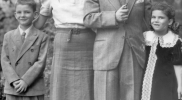
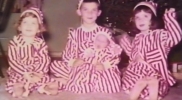




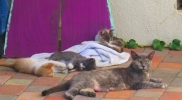

![[000015] [000015]](https://beforetheblog.com/wp-content/gallery/kids/thumbs/thumbs_000015.jpg)
